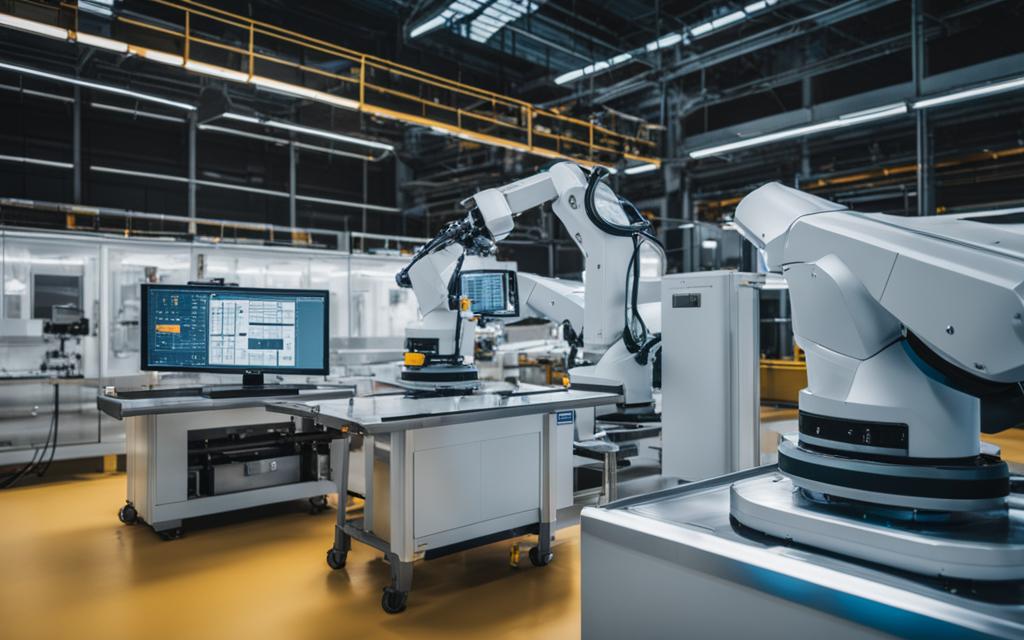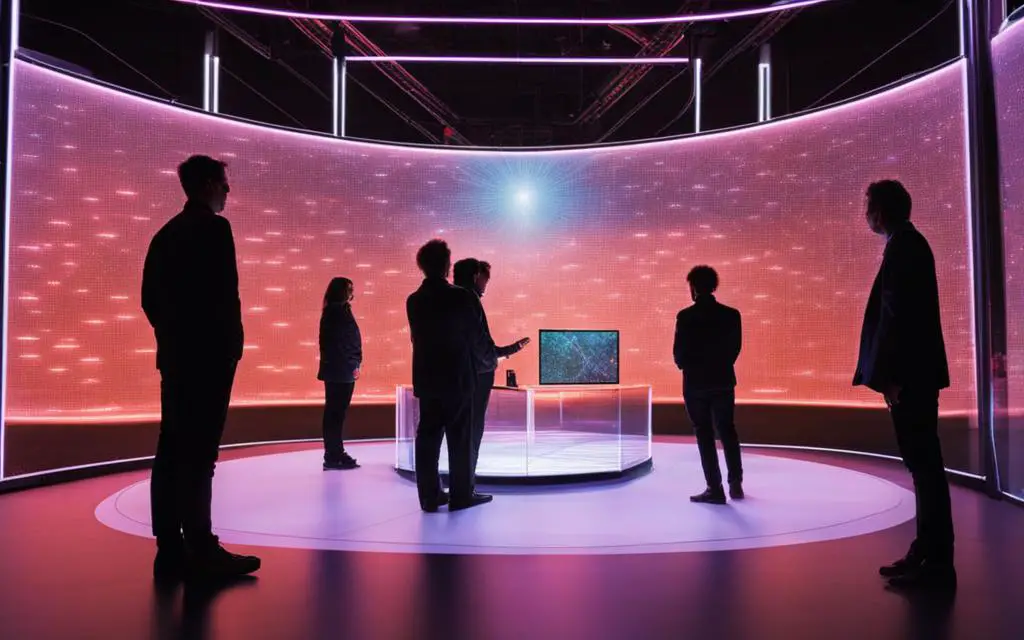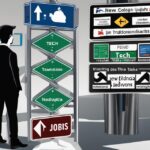Artificial Intelligence (AI) has the potential to revolutionize our lifestyle in ways that were previously unimaginable. From healthcare to finance, the implementation of AI is rapidly transforming various sectors. AI is enabling the development of self-driving cars, personalized medical treatments, and more. It is important to understand the rise of AI and its impact on our world as we stand on the brink of a new era.
In this article, we will explore the impact of AI on industries, the job market, potential biases and discrimination in AI, the evolution of AI, and its application in various sectors. We will delve into the AI technology trends and discuss the future of artificial intelligence.
Be prepared to discover how AI is reshaping tomorrow and how it will affect our lives in the coming years. Let’s dive into the exciting world of AI and future technology together!
The Impact of AI on Industries
Artificial Intelligence (AI) is revolutionizing industries across the board, making a significant impact on efficiency and productivity. Through the implementation of AI systems and robots, automation is taking over repetitive, boring, and dangerous tasks, allowing humans to focus on more innovative and strategic work. This technological advancement is reshaping industries such as healthcare and finance, where AI is being utilized to improve diagnoses, personalize medical treatments, and enhance investment decisions.
| Industry | Impact of AI |
|---|---|
| Healthcare | AI is being used to analyze large amounts of medical data, improving diagnoses and treatment plans. |
| Finance | AI algorithms are being utilized for investment decisions, fraud detection, and automating back-office processes. |
AI is also playing a crucial role in transportation, manufacturing, education, media, and customer service industries. In transportation, the development of self-driving cars and AI travel planners is advancing rapidly. Manufacturing is benefitting from AI-enabled robotics and predictive analysis, optimizing production processes. Education is being transformed through personalized learning and adaptive systems, tailoring education to individual needs. The media industry is utilizing AI for automated content generation, enhancing efficiency and creativity. Customer service is being revolutionized through the use of AI-powered chatbots and virtual assistants, providing immediate support and assistance.
Quotes:
“AI has the potential to significantly boost productivity, streamline processes, and pave the way for innovative solutions across industries.”
In conclusion, AI is having a profound impact on various industries, leading to increased efficiency and productivity. From healthcare to finance, transportation to customer service, AI is transforming the way businesses operate. It is important for companies to embrace and adapt to this technological revolution to stay competitive in the rapidly evolving landscape.
Job Market and AI
The impact of AI on employment is a topic that sparks debate and raises concerns. Critics argue that widespread automation will lead to job losses, increased poverty, and inequality. While these concerns are valid, it is important to consider both the potential job losses and job creation that AI may bring.
Automation has historically displaced workers in certain industries but has also created new job opportunities in others. As AI continues to advance, there will be a growing demand for high-skilled jobs in fields such as data science, machine learning, and AI development. These jobs require expertise in managing and implementing AI technologies, analyzing complex data sets, and understanding the ethical implications of AI.
Furthermore, AI is expected to augment human capabilities rather than replace them entirely. By automating repetitive and mundane tasks, AI can free up human workers to focus on more innovative and strategic work. This shift can lead to a more productive and efficient workforce, where humans and AI systems work collaboratively to achieve better outcomes.
“The future is not one of humans versus machines; it is one of humans and machines working together.” – Fei-Fei Li, Co-Director of the Stanford Institute for Human-Centered Artificial Intelligence
While it is important to acknowledge the potential impact of AI on employment, it is also crucial to address the challenges it presents. Upskilling and reskilling programs should be implemented to prepare the workforce for the changing demands of the job market. Government policies and regulations should be in place to ensure that AI technologies are developed and deployed responsibly, with a focus on minimizing biases and discrimination.
| Impact of AI on Employment | Potential Job Creation |
|---|---|
| Job losses in certain industries | High-skilled jobs in data science, machine learning, and AI development |
| Automation of repetitive tasks | Increased productivity and efficiency |
| Concerns about increased poverty and inequality | Potential for collaboration between humans and AI systems |
It is clear that the impact of AI on the job market is complex and multifaceted. While there may be challenges and concerns, there are also opportunities for innovation, growth, and the creation of new job roles. By embracing AI technology and ensuring its responsible development, we can navigate the evolving job market and shape the future of work in a way that benefits both individuals and society as a whole.
Biases and Discrimination in AI
Artificial Intelligence (AI) has the potential to revolutionize industries and improve various aspects of our lives. However, as AI systems become more prevalent, it is crucial to address the potential biases and discrimination that can arise.
AI systems are only as unbiased as the data they are trained on. If the data used to train AI contains biases, the system is likely to reproduce those biases in its outputs. This can perpetuate existing biases and discrimination, leading to unfair treatment of certain groups of people.
“The algorithms that drive AI systems can inherit biases from society, as they learn from historical data,” says Dr. Sarah Johnson, a leading AI researcher. “If we’re not careful, these biases can reinforce inequities and perpetuate discrimination.”
One example of bias in AI is facial recognition algorithms being less accurate for individuals with darker skin tones. This can lead to misidentifications and potential harm, such as false arrests or denials of service. It is crucial to address these biases through rigorous testing, diverse training data, and ongoing monitoring of AI systems.
| Common Biases in AI | Impact |
|---|---|
| Gender biases in hiring algorithms | Can perpetuate gender inequality in the workplace |
| Racial biases in predictive policing | Can lead to over-policing of certain communities |
| Socioeconomic biases in credit scoring | Can exclude disadvantaged individuals from financial opportunities |
| Age biases in healthcare algorithms | Can result in inadequate care for certain age groups |
To mitigate biases and discrimination in AI, regulations and ethical guidelines must be established. This includes transparency in AI systems, allowing users to understand how decisions are being made. Additionally, education and training programs can help AI developers and users understand the potential biases and take proactive steps to address them.
By recognizing and actively working to reduce biases and discrimination in AI, we can ensure that technology benefits all individuals and promotes a fair and inclusive society.
The Evolution of AI
The field of Artificial Intelligence (AI) has experienced remarkable growth and development, shaping the world as we know it today. Over the years, AI has evolved from its early beginnings to become a powerful force driving advancements in technology and reshaping various industries. Let’s take a closer look at the history and evolution of AI.
AI has its roots in the 1950s, with the pioneering work of researchers like Alan Turing and John McCarthy. These visionaries laid the foundation for the field, introducing concepts such as machine learning and intelligent machines. However, it wasn’t until the 21st century that AI truly started to flourish, thanks to advancements in computing power and data availability.
Today, AI is divided into two main categories: narrow AI and artificial general intelligence (AGI). Narrow AI refers to AI systems that are designed to perform specific tasks and excel in specialized domains. Examples include voice assistants like Siri and Alexa, recommendation algorithms, and image recognition software. On the other hand, AGI aims to develop machines that possess general intelligence similar to humans, capable of performing any intellectual task a human can do.
AI has come a long way since its inception and continues to evolve at a rapid pace. With advancements in neural networks, machine learning algorithms, and probabilistic methods, researchers and developers are pushing the boundaries of what AI can achieve.
One of the key drivers of AI’s evolution is the abundance of data available today. The proliferation of digital devices and the growth of the internet have resulted in an unprecedented amount of data being generated and collected. This vast dataset serves as fuel for AI algorithms to learn and improve their performance.
As we move forward, the future of AI holds great promise. Researchers are exploring new frontiers such as explainable AI, where AI systems can provide insights into their decision-making processes, ensuring transparency and trust. Additionally, there is ongoing work to address the biases and ethical concerns associated with AI, ensuring that the technology benefits everyone equally.
The Evolution of AI in a Nutshell
| Decade | Milestone |
|---|---|
| 1950s | Alan Turing and John McCarthy lay the groundwork for AI. |
| 1980s | AI experiences a period of reduced interest and funding. |
| 1990s | Machine learning becomes a significant area of research. |
| 2000s | Advancements in computing power and data availability fuel the growth of AI. |
| Present | AI systems are deployed across various industries, impacting society in profound ways. |
As AI continues to evolve, it holds immense potential to transform industries, solve complex problems, and improve our daily lives. From healthcare to transportation, AI is poised to revolutionize how we work, learn, and interact with the world around us. Embracing AI’s evolution requires responsible development, ethical considerations, and ongoing research to ensure that AI remains a force for good in our ever-changing world.

AI in Various Industries
AI has already made a significant impact in various industries, revolutionizing processes and transforming the way businesses operate. Let’s explore how AI is being leveraged in transportation, manufacturing, healthcare, education, media, and customer service.
AI in Transportation
In the transportation sector, AI is driving innovation and paving the way for autonomous vehicles. Self-driving cars powered by AI algorithms are being developed to enhance road safety and reduce human error. Furthermore, AI is being used in AI travel planners to optimize routes, improve traffic management, and provide real-time updates to travelers, ensuring a seamless travel experience.
AI in Manufacturing
Manufacturing industries are benefiting from AI adoption in various ways. AI-enabled robotics systems are improving production efficiency and accuracy, leading to increased productivity and cost savings. Additionally, AI-powered predictive analysis is being utilized to optimize supply chain management, forecast demand, and prevent equipment failures, minimizing downtime and optimizing operations.
AI in Healthcare
In the healthcare industry, AI is playing a crucial role in revolutionizing patient care. AI algorithms are being used to analyze large quantities of medical data, helping healthcare professionals make more accurate diagnoses and treatment decisions. AI-powered virtual assistants and chatbots are also being employed to provide personalized patient support, answer queries, and assist in patient monitoring, enhancing the overall healthcare experience.
AI in Education
AI is transforming the education sector by offering personalized learning experiences and adaptive systems. Intelligent tutoring systems are being developed to provide customized educational content and support based on individual student needs. AI-powered virtual reality (VR) and augmented reality (AR) technologies are also being integrated into educational curriculums, enabling immersive and interactive learning experiences.
AI in Media
The media industry is leveraging AI to automate content generation and enhance user experiences. AI algorithms are being used to analyze vast amounts of data, enabling personalized content recommendations and targeted advertising. Natural language processing (NLP) technologies are also being employed to create AI-powered virtual news anchors and chatbots, providing real-time news updates and engaging user interactions.
AI in Customer Service
Customer service is being revolutionized by AI-powered chatbots and virtual assistants. These AI systems are capable of handling customer inquiries, providing product recommendations, and resolving common issues. By leveraging AI technology, businesses can provide round-the-clock support, improve response times, and enhance customer satisfaction levels.

AI is reshaping various industries, opening up new possibilities and improving efficiency. As the technology continues to evolve, it is anticipated that AI will play an even larger role, driving further advancements and innovation. By embracing AI, businesses can stay ahead of the curve and unlock the full potential of this transformative technology.
Conclusion
The rise of AI is shaping the future of society in profound ways. The potential of AI to increase efficiency, productivity, and solve complex problems is undeniable. From self-driving cars to personalized healthcare, AI technology is already making a significant impact across industries.
However, it is important to acknowledge the challenges that come with AI. Biases in AI systems can perpetuate existing biases and discrimination, highlighting the need for regulations and ethical development practices. The impact on employment is a topic of debate, as automation may create new job opportunities while also displacing workers.
To navigate the future of AI, responsible and ethical development is crucial. It is imperative for society to invest in education and training programs to prepare individuals for the evolving job market. Establishing regulations and guidelines can help mitigate potential negative impacts and ensure that AI technology is developed with humanity in mind.
The future of AI holds both opportunities and uncertainties. By shaping the impact of AI through responsible practices, we can harness its potential to drive innovation, improve lives, and build a brighter future.
Source Links
- https://builtin.com/artificial-intelligence/artificial-intelligence-future
- https://www.simplilearn.com/future-of-artificial-intelligence-article
- https://moderndiplomacy.eu/2023/02/05/the-future-is-now-the-rise-of-ai-and-its-shaping-of-tomorrow/





